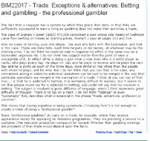One thing to remember in all this discussion is that HMRC do actually tax spreadbetting (over and above CFDs for example) and obtain quite a resonable tax income from it already.
This is because all companies that are registered as offering Spread Betting products (so are acting as Bookmakers) have to pay 3% of their Gross profits in the form of Tax, CFD companies doe not have to pay this Gross Profits Tax as HMRC will instead directly tax the winning traders via CGT / Income Tax.
This Spread bet Gross Profts tax (GPT) is passed onto their "punters" in the form of wider spreads etc..., which is why the prices you can obtain via SB are not usually as good as can be obtained via CFDs etc.. This tax was introduced back in approx 2001 so HMRC could get their Tax from Gambling direct from the companies rather than having to go after the winning punters.
HM Revenue & Customs
Simon from CapitalSpreads when discussing GPT (on another forum) said that approx 15% of punters win in the longer term and 85% loose (cant find the exact quote at the moment but that was the gist).
If we therefore took 100 punters at random, with 85 loosing say £100 = £8500 and 15 winning £100 = £1500 in any given tax year, then the Gross Profits for the Spreadbetting Company (before all costs, wages, other taxes etc are accounted for) would be £8500-£1500 = £7000
HMRC than take their 3% GPT which is 3% of £7000 = £210.
If HMRC instead went after winning punters then to get their £210 pounds income from the £1500 made by the winning SB's would require them to tax the winners at an average rate of £120/£1500 = 14%. This is on the assumption that all £1500 the winners made is above the CGT/Income tax thresholds (depending on what tax HRMC are looking for from these winning punters) and they could find / identify them all anyway. (and this also assumes they could do so without ever alowing losses to be recoveed from other loosing spreadbetters!!)
So as I understood it back in 2001 when they were looking at how to obtain a decent tax income from Spread Betting it was concluded that simply getting the 3% Tax directly from the SB companies Gross Profits was the far simpler way for HMRC to have its pound of flesh from the gambling punters (by in effect getting the SB companies to collect it for them), with least effort.
If HMRC also started going after winning SB punters in any significant way, then surely it would bring into questions why SB companies have to pay the 3% GPT directly to HMRC (as CFD companies dont) as this would then start to become a double taxation on winning punters / the SB industry ?
Or am I missing something ?


